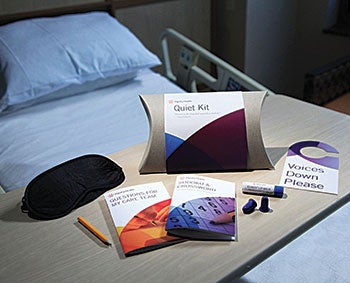Quest for quiet leads to a patient kit that's making some noise
 |
| The Quiet Kit was a key piece of raising patient satisfaction scores at one Dignity Health hospital. Photo courtesy of Medline |
With reimbursement tied to patient satisfaction, and the perception of quiet during a hospital stay a contributing factor, the stakes are higher than ever for hospitals to reduce noise levels.
Dignity Health, San Francisco, which has hospitals in three states, is banking on a host of actions, including the development of a Quiet Kit that is distributed to all patients throughout its system to give them more control over their environment.
The kit includes ear plugs, eye mask, lip balm, a puzzle book, a 'quiet please' door hanger and a health care booklet given to patients in a recyclable pillow box.
Additional steps taken at St. John's Regional Medical Center, Oxnard, Calif., the first Dignity hospital to try the Quiet Kit, also were critical in reducing noise, says Laurie Harting, former chief executive officer of St. John's and now senior vice president of operations for the Sacramento service area at Dignity Health, Rancho Cordova, Calif.
Those steps include giving nurses hands-free communication devices, eliminating overhead pages and muting motorized floor cleaning equipment. The focus on reducing noise was key to raising St. John's performance standing within Dignity from 15th to third and also boosting its HCAHPS and patient recommendation scores. The Quiet Kits were an important piece of the progress for more than one reason, Harting says.
The Quiet Kits "empowered the staff to assist in diminishing more distracting noises of the environment," states a report called "Cultivating the Healing Environment: Changing the Cultural Perception of Quietness in the Hospital," written by Harting and other St. John's leaders.
The Quiet Kit also gave staff an opportunity to engage in friendly dialogue with patients about how to use the contents and turn the focus of the interaction to "healing and kindness rather than the illness or injury that led to the hospital stay," the report states.
Another benefit was giving environmental services staff, who also distributed the kits with clinical staff, an opportunity to become more directly involved with patient care and become an integrated part of the care team.
The Quiet Kit's simplicity belies the journey leading to its creation, which was done with great care and research. What started two years ago as a mission to strengthen the branding of St. John's evolved into focusing on improving the overall patient experience just as value-based purchasing and new reimbursement rules were taking hold, Harting says.
At the advice of Keith Callahan, vice president of supply chain at Dignity, Harting began working with health care supply manufacturer Medline Industries Inc., Mundelein, Ill., to develop products that increase patient satisfaction and extend the Dignity brand.
Former deputy chief medical officer for the Centers for Medicare and Medicaid Services and consultant Trent T. Haywood, M.D., was brought in by Medline to research factors that would improve patient experience as it relates to HCAHPS scores.
Haywood, who is now senior vice president, chief medical officer, Office of Clinical Affairs, BlueCross BlueShield Association, reported that the three most important factors are quietness of the environment, overall cleanliness and patient-care team interaction.
Medline then brought in design wunderkind Deborah Adler, president, Adler Design, New York City, to create prototypes of products that would fulfill Haywood's recommendation. With input from several staff leaders, the Quiet Kit was born along with a companion kit called Refresh and Relax for long-term patients, which includes a few additional toiletry items.
After the initial rollout at St. John's, the Quiet Kit is now being used at all hospitals throughout Dignity. Its impact is under evaluation, but early returns are positive.




